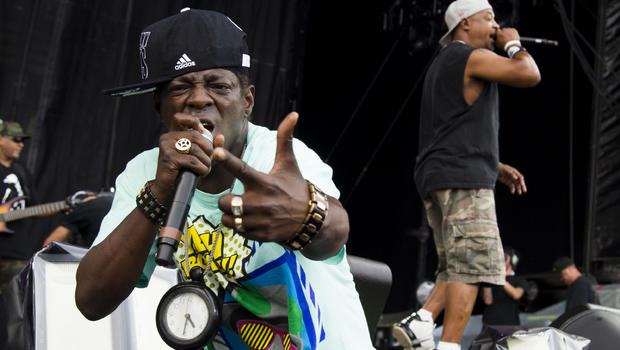Elvis Presley and Racism : The Ultimate, Definitive Guide : Elvis & Racism : Racism 1950s, 1960s, 1970s. : 'For Elvis Fans Only' Official Elvis Presley Fan Club
How Did Elvis Get Turned Into a Racist? : Was Elvis A Racist? : Elvis Articles : : 'For Elvis Fans Only' Official Elvis Presley Fan Club
Why I stopped hating Elvis Presley | Atlanta Music Blog | Atlanta Concerts & Shows | Crib Notes | Creative Loafing Atlanta
Elvis never said he was the King of Rock or that he invented Rock music:
How Did Elvis Get Turned Into a Racist? : Was Elvis A Racist? : Elvis Articles : : 'For Elvis Fans Only' Official Elvis Presley Fan Club
Why I stopped hating Elvis Presley | Atlanta Music Blog | Atlanta Concerts & Shows | Crib Notes | Creative Loafing Atlanta
One of the favorite arguments of the anti-Elvis cadre is that one of his most memorable recordings, Hound Dog, was 'stolen' from Big Mama Thornton, an incredibly talented black blues singer who recorded her sultry, simmering version in 1953. Contrary to popular belief, Hound Dog was not some long-lost song of the back bayou, but a Lieber and Stoller composition. So, technically, if you follow this line, both Elvis and Big Mama Thornton 'stole' the song from two white, New York Jews. For shame!
I can't remember a time when covering a recording by another artist was considered 'stealing' -- this would mean that when Blind Willie McTell recorded Dying Crapshooter's Blues he was maliciously stealing (the white) Irving Mills's St. James Infirmary. For that matter, both the American white Mills and the American black McTell 'stole' the song from the old British folk ballad The Unfortunate Rake, popular in the late 1700s.
This argument falls apart upon even a cursory investigation, and with it the entire 'Elvis stole the black man's sound' argument put forth by Mos Def, Chuck D., and hundreds of guilty white hippies over the last fifty years. There is no 'stealing' in terms of folk music: the stew of racial, social, and (most importantly) aural traditions that constitutes American roots music cannot be reduced to simple black and white, moralistic terms.
[Jackie Wilson : 'A lot of people have accused Elvis of stealing the black man's music, when in fact, almost every black solo entertainer copied his stage mannerisms from Elvis'.]
Asked to characterize his singing style when he first presented himself for an audition at the Sun recording studio in Memphis, Elvis said that he sang all kinds of music - 'I don't sound like nobody'. This, as it turned out, was far more than the bravado of an 18-year-old who had never sung in public before. It was in fact as succinct a definition as one might get of the democratic vision that fueled his music, a vision that denied distinctions of race, of class, of category, that embraced every kind of music equally, from the highest up to the lowest down.
Elvis would have been the first to agree. When a reporter referred to him as the 'king of rock 'n' roll' at the press conference following his 1969 Las Vegas opening, he rejected the title, as he always did, calling attention to the presence in the room of his friend Fats Domino, 'one of my influences from way back'. The larger point, of course, was that no one should be called king; surely the music, the American musical tradition that Elvis so strongly embraced, could stand on its own by now, after crossing all borders of race, class and even nationality.
Memphis, Elvis' kingdom, is a near perfect reflection of the problems with the music industry and society at large. The Bluff City is known for its blues. Known for its soul. Known for BB King, Isaac Hayes, Aretha Franklin, Rufus and Carla Thomas, Booker T. & the MGs, Al Green and one of the most influential recording studios of all time: Stax. While Elvis shrines were popping up all over town, black contributions were being dismantled. The Stax recording studio was demolished in 1989. The same fate nearly befell one of the Civil Rights era's most important landmarks, the Lorraine Motel, where Dr. Martin Luther King Jr was assassinated. As much as singer Mavis Staples loved Elvis and his music, his unbridled legacy bothered her. 'What helped Elvis was that when he did interviews, he would tell that he got it from blacks', Staples said. 'Now one thing that I could say for myself was that when I came back to Memphis after Stax closed, maybe about five years later, I only saw Elvis. And that's when I said, 'wait a minute'. Something should be out here about Stax. Just because it folded doesn't mean it didn't happen. And the people of Memphis should have remembered all of the music'.
Soul singer Isaac Hayes, back into the limelight after his stint as South Park's Chef, said he understands how Elvis' memory became entangled in broader issues of race. 'Elvis was due the respect he had. No animosity. No sour grapes. Elvis was the man', he said. 'The thing was that we didn't get what we (the black artists) deserved. Ignorance is one of the main things. Racism? It's one of the factors. I would say it took the whole world outside of Memphis to recognize what a treasure black Memphis had'.
Jackie Wilson : 'A lot of people have accused Elvis of stealing the black man's music, when in fact, almost every black solo entertainer copied his stage mannerisms from Elvis'. In Elvis Presley, Last Train To Memphis: The Rise of Elvis Presley, author Peter Guralnick describes the meeting between the two backstage at The Trip: 'In between sets Elvis finally got the opportunity to meet Jackie and express his unreserved admiration for Wilson's talent. With all he had going for him, Elvis said, he could see no reason why Jackie shouldn't be the number one singer in the world'. It was a wonderful tribute which Jackie would have appreciated. Jackie's drummer Jimmy Smith recalls; 'Elvis came to the club in a white suit and a white Rolls Royce. I said, 'That man's got style, ain't he?' Jackie said of Elvis' visit; 'Elvis did me a nice favour once. I was in Hollywood, California, playing a club called The Trip and we were having a little difficulty getting people to come out at that particular time. So he came out twice for me and, well, you couldn't get in. They said if Elvis goes, well ... hey, let's go'.
Elvis invited Jackie out to the movie set to see him. Jackie took up the offer, visiting Elvis at MGM, where they had photos taken like two old friends. Elvis signed the photo for Jackie, writing 'Jackie, you have a friend forever, Elvis'. Jackie carried the photo everywhere thereafter; it was a treasure. [When Jackie had a stroke in 1975 leaving him unable to perform and hospitalised, Elvis covered a large proportion the medical bills.]
Sonny West, who was a close friend of Elvis' and one of his inner circle for many years, said; 'Elvis loved Billy Ward, Billy Daniels, Billy Eckstine, the Inkspots - he loved all of them. He took something from all of them and it all came together in his voice at different times. Jackie was rhythm and blues; Elvis would tell you that the influence of gospel singing and rhythm and blues helped form his style of singing. And what came out was rock 'n' roll ... somehow they got together and you had rock 'n' roll.
James Brown : 'I wasn't just a fan, I was his brother. He said I was good and I said he was good; we never argued about that. Elvis was a hard worker, dedicated, and God loved him. Last time I saw him was at Graceland. We sang Old Blind Barnabus together, a gospel song. I love him and hope to see him in heaven. There'll never be another like that soul brother'. [James was the first entertainer to arrive at Elvis' funeral.]
James Brown : 'We were friends for a long time, for twenty years. And he told me, he'd ride around Memphis around the streets he'd come up in, all alone at night. Ride around on his motorcycle when he was sure the rest of the world was asleep, just kind of hauntin' them places he hung around in as a kid. He was a country boy'. And as only James Brown could say, 'Elvis and I are the only true American originals. I love him and hope to see him in heaven. There'll never be another like that soul brother'. [James Brown was so moved by Elvis' death that he requested, and was allowed, time alone with Elvis as he lay in his coffin at Graceland.]
Al Green : 'Elvis had an influence on everybody with his musical approach. He broke the ice for all of us'.
Eddie Murphy : 'That's my idol, Elvis Presley. If you went to my house, you'd see pictures all over of Elvis. He's just the greatest entertainer that ever lived. And I think it's because he had such presence. When Elvis walked into a room, Elvis Presley was in the f***ing room. I don't give a f*** who was in the room with him ...
Question to Eddie Murphy by Rolling Stone Magazine November 9, 2011.
Have you had to defend your Elvis fandom to African-Americans who think he was racist?
Eddie Murphy : 'The big myth in the African-American community was that he said that the only thing black folks could do for him was shine his shoes and buy his records. People liked him when they were young, then said, 'I don't like him because he said that', and I said, 'He never even said that'.
Elvis never said he was the King of Rock or that he invented Rock music:
"The colored folks been singing it and playing it just like I'm doing now, man, for more years than I know," Elvis told reporters in 1956. "I got it from them. Down in Tupelo, Mississippi, I used to hear old Arthur Crudup bang his box the way I do now, and I said if I ever got to the place where I could feel all old Arthur felt, I'd be a music man like nobody ever saw." (One could reasonably argue that Crudup's original That's All Right, which rocks at least as hard as Presley's follow-up take, is actually the first rock song) Ike Turner has said that when he performed in the black sections of Memphis in 1952 Presley would attend his concerts. In an interview with London's Daily Telegraph in 2001, Turner recalled that at the time he thought Presley "was just a white boy that would come over to black clubs. He would come in and stand behind the piano and watch me play. I never knew he was no musician."
Instead Elvis was influenced by the blues as a music genre. Big Mama Thornton, Arthur ‘Big Boy’ Crudup, The Prisonaires, Lowell Fulson, Chuck Berry, Bo Diddley, Little Richard, Fats Domino and many others were all admired by Elvis who recorded many of their songs while traces of their music, delivery and style are evident in many of his other recordings











